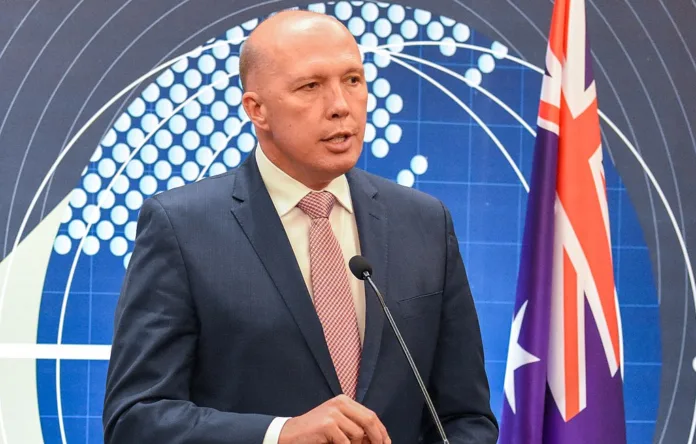Opposition leader Peter Dutton argues against granting visas to Palestinians escaping Gaza, citing national security risks, as new figures reveal a high rate of visa refusals
On August 14, 2024, Australian Opposition Leader Peter Dutton publicly stated his position against admitting Palestinians fleeing the Gaza Strip into Australia. Dutton’s stance stems from concerns over national security, particularly regarding potential affiliations with Hamas, a group recognized as a terrorist organization by Australia.
In a Sky News interview, Dutton emphasized that the ongoing conflict in Gaza poses significant risks, and he questioned the adequacy of current security screenings. He remarked, “If people are coming in from that war zone and we’re uncertain about their identity or allegiances – Hamas is a listed terrorist organisation. I don’t think people should be coming in from that war zone at all at the moment. It’s not prudent to do so and I think it puts our national security at risk.”
Embed from Getty ImagesRecent statistics reveal that since the October 7, 2023, Hamas attack on Israel, Australia has refused 7,111 visa applications from Palestinians. During the same period, the government granted 2,922 visas to holders of Palestinian Authority travel documents, primarily as visitor visas. Approximately 1,300 Palestinians have arrived in Australia, with around 40 visitor visas canceled and subsequently reinstated for some.
The situation is complicated by the fact that many applicants are children, and new Home Affairs Minister Tony Burke has indicated that the government is working on a solution to address their situation given the ongoing conflict. The government has pledged not to return these individuals to Gaza while the war persists.
Prime Minister Anthony Albanese criticized Dutton’s position, accusing him of fueling division. Albanese argued, “This bloke always seeks to divide… We take our advice from the Director-General of ASIO and the security agencies. Not from someone always looking for a fight, always looking for division.”
The Australian Security Intelligence Organisation (ASIO) has conducted security checks on some entrants but acknowledges that rhetorical support for Hamas does not automatically disqualify individuals. ASIO Chief Mike Burgess stated, “When things get referred to ASIO we deal with them effectively. Of course there might be times when they didn’t get referred to us in time [but] once we become aware of them, we’re able to do [security] assessments.”
Despite these assurances, Coalition Home Affairs spokesperson James Paterson has called for every person fleeing Gaza to be referred to ASIO for thorough vetting. He criticized the current process and advocated for stricter measures against supporters of Hamas.
In response, Education Minister Jason Clare pointed out that the Rafah gate, a primary exit from Gaza, is currently closed, making further arrivals from Gaza impossible. Clare invited Dutton to meet with Palestinians already in Australia to better understand their plight.
NDIS Minister Bill Shorten also challenged Dutton’s position, stating, “We currently have a process where ASIO vets people, where we have national security checking. Memo to Peter Dutton, we’re using the same process that he used. It’s a very small number of people who have been accepted here temporarily. Their temporary visas are coming to an end. Unfortunately, the war in Gaza isn’t over, so how humane is it to send people we’ve accepted back?”
Analysis
Political Dutton’s stance on Gaza refugees is stirring political debate in Australia. His focus on security concerns aligns with broader conservative apprehensions about immigration from conflict zones. The debate highlights the tension between national security and humanitarian responsibilities. The Labor government’s response, emphasizing the complexity of the situation and the existing vetting processes, contrasts sharply with Dutton’s hardline approach, potentially shaping the political narrative and influencing public opinion on immigration and refugee policies.
Social The debate over Palestinian refugees from Gaza reflects broader societal concerns about immigration and national security. Public reactions to Dutton’s position may reveal prevailing attitudes towards refugees and immigrants, especially those from conflict zones. This situation also underscores the challenges of balancing compassion with security in a time of global unrest. The discussion highlights societal divisions between those prioritizing humanitarian support and those emphasizing security measures.
Racial While the issue primarily revolves around national security, it intersects with racial and ethnic considerations. Palestinians, being a minority group from a conflict-ridden area, may face discrimination and biases. The discourse around their entry into Australia could exacerbate racial tensions and affect perceptions of fairness in immigration policies. Ensuring that policies do not unfairly target specific ethnic or national groups is crucial for maintaining social harmony.
Gender Gender dynamics are less central in this case but still relevant. Women and children, who make up a significant portion of those fleeing Gaza, face unique vulnerabilities. The policy decisions regarding their entry into Australia could impact their safety and well-being. Addressing these gender-specific needs and ensuring that policies are sensitive to the challenges faced by women and children in conflict zones is essential.
Economic The economic implications of Dutton’s stance include potential impacts on Australia’s social services and immigration systems. While the number of individuals involved may be relatively small, the political and public debate could influence future immigration policies and budgets. Additionally, the situation might affect Australia’s international reputation and its relationships with countries affected by the Gaza conflict.
